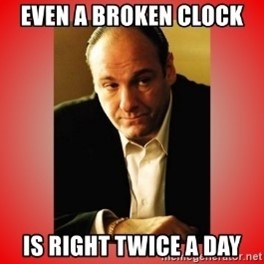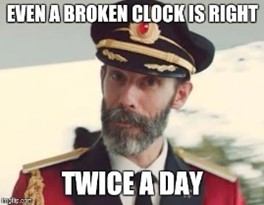Are you looking for a way to describe a person that usually gets things wrong but occasionally says something factually correct? You can use the expression “even a broken clock is right twice a day.” This post unpacks the meaning and origin of this expression.
Meaning
The expression “even a broken clock is right twice a day” means that people who usually give out bad information are sometimes right.
Example Usage
“Mike is a lousy gambler, and he always bets the wrong side, but he won this weekend with that bet on the Eagles game. I guess even a broken clock is right twice a day.”
“Normally, you can’t believe a word Suzie says; she’s always spouting disinformation. She got it right today, though, and it looks like even a broken clock is right twice a day.”
“I’ve never seen a market correspondent get things wrong as often as Denis Gartman. However, he called the top right this time. I guess even a broken clock is right twice a day.”
“Tim never calls it right. He’s the worst judge on the panel. But he got it right this weekend, proving that even a broken clock is right twice a day.”


Origin
The origin of the expression “even a broken clock is right twice a day” comes from the 1700s. It first appeared in a magazine, “The Spectator,” published by Richard Steele and Joseph Addison in 1711, where it appears as follows.
“If instead of running after the mode, they would continue fixed in one certain habit, the mode would come time or other overtake them, as a clock that stands still is sure to point right once in twelve hours.”
The 1880 novel “Pious Frauds,” written by Albany de Grenier Fonblanque, used the following expression.
“Even a stopped clock is right, we know, twice in the twenty-four hours.”
The phrase would also appear in “Speaker’s Encyclopedia of Stories, Quotations, and Anecdotes,” written by Jacob M. Braude in 1955, where it appears as follows.
“No man’s advice is entirely worthless. Even a watch that won’t run is right twice a day.”
An Illinois newspaper published a version of the expression in an article referencing the work of Herbert V. Prochnow in 1967, where it appears as follows.
“Even a stopped clock is right twice every day. After some years, it can boast of a long series of successes. Marie von Ebner-Eschenbach.”
Phrases Similar
- Even a stopped clock is right twice a day.
- A clock that stands still is sure to point right once in twelve hours.
- A broken watch is certain to be right twice a day.
Phrases Opposite
- You’re always right.
- Are you ever wrong?
- Spot on again.
What is the Correct Saying?
- Even a broken clock is right twice a day.
Ways People May Say It Incorrectly
The phrase is a way of saying that even people with bad information tend to get things right from time to time. Using the expression to describe a stopped clock or watch is incorrect.
Acceptable Ways to Phrase It
You can use the saying “a broken clock is right twice a day” when you’re telling someone that they can’t rely on the information they receive from their source. The phrase suits social and professional use.
At the office, you could use the phrase to describe a colleague that doesn’t know what they are doing and gets lucky with a decision.
Or you could use it as a retort to a friend after receiving incorrect information that may turn out to be true in the future.